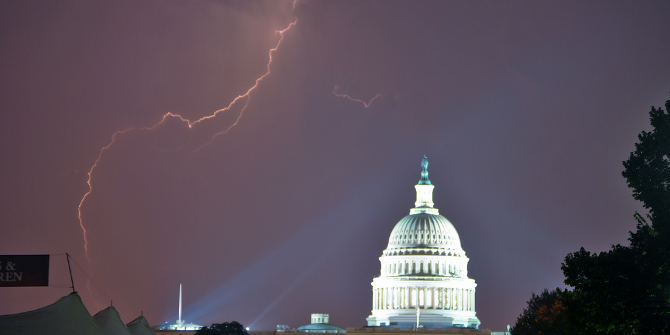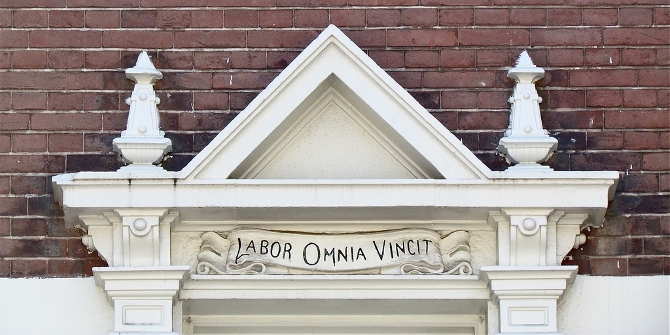


 To what extent are local races across the United States being increasingly driven by politics at the national level? Jamie Carson, Damon Cann, Jeffrey Yates, and Ronald Wright examine the nationalization of elections for state executive branches’ primary front line legal actors in the criminal courts – local prosecutors. They find that incumbent prosecutor candidates from the same party as the presidential candidate that won in their district have a 20 percent higher chance of winning.
To what extent are local races across the United States being increasingly driven by politics at the national level? Jamie Carson, Damon Cann, Jeffrey Yates, and Ronald Wright examine the nationalization of elections for state executive branches’ primary front line legal actors in the criminal courts – local prosecutors. They find that incumbent prosecutor candidates from the same party as the presidential candidate that won in their district have a 20 percent higher chance of winning.
For the past few decades, elections in the United States have becoming increasingly nationalized. Whereas electoral politics throughout much of the twentieth century focused primarily on local factors, it is more common today for voters to view events through the lens of national politics. This pattern of increasing nationalization is not limited to US House and Senate elections, however. Indeed, this increase in nationalization has begun affecting statewide and local races as well.
One prominent example of this trend is the races for state executive branches’ primary field-level legal officers – local prosecutors. In the United States, prosecutors wield extraordinary power within the criminal justice system – the United States is the only country where local prosecutors are elected. As issues such as sentencing, racial incarceration disparities, and violent crime gain greater visibility, campaigns for local prosecutors have garnered increased attention due to their significant influence in the criminal justice system. This is particularly evident among a new wave of “progressive prosecutors” who aim to reduce the traditional reliance on widespread incarceration in favor of alternative accountability and prevention methods. We have seen this play out quite vividly in recent months considering former President Trump’s criminal trials for alleged past indiscretions and given his recent conviction on 34 counts of falsified business records in the state of New York.
All politics is national: Even at the local level
In context of elections, nationalization implies an amplified connection between presidential and state and local elections. In his 2018 book, The Increasingly United States: How and Why American Political Behavior Nationalized, University of Pennsylvania political scientist, Daniel J. Hopkins illustrated that nationalization is a process where voters rely less and less on local factors such as candidate attributes (i.e., political background or elective office experience) when choosing who to support on election day, and more on factors such as which party currently resides in the White House. Consequently, factors like incumbency or local candidates’ individual ideology become secondary to factors like an individual’s partisanship or preferred choice for president during periods of greater nationalization.
Regardless of whether it is measured in terms of the partisan outcome of an election contest or the correlation between partisan vote shares across competitions, there is also ample evidence of nationalization in aggregate election outcomes across a variety of state and local contests. We argue this trend also affects prosecutorial elections. As local prosecutors increasingly find their way into the national spotlight in high profile prosecutions (e.g., election fraud) and calls for criminal justice reform (and critiques of such reforms) make their way onto national media platforms, it is likely that prosecutor elections gain salience and become intertwined with national concerns. An era of strong consensus about the enforcement priorities of state prosecutors – a vision shared by both Republicans and Democrats – has given way to a time of broader choices for voters and more vigorous policy and ideological debates. Voters now face competing approaches to the prosecutor’s job, and likely draw on their broader ideological loyalties to evaluate those choices, which are heavily influenced by the increased nationalization of politics.

“As if they were running together…” (CC BY 2.0) by quinn.anya
Nationalized elections and prosecutors
The prosecutor is one of the most powerful figures in the American criminal justice system for several reasons. First, the tools of legal accountability to ensure that prosecutors act lawfully are weaker in the US compared to other countries. State criminal codes provide only modest constraints on prosecutorial decisions, allowing broad discretion in how they interpret and apply the law. Prosecutors have significant latitude in choosing which charges to bring, with judges and other courtroom actors unable to effectively challenge a decision not to file charges. When prosecutors do choose charges, judges and juries can only evaluate the sufficiency of evidence for those specific charges during a trial. Additionally, most criminal cases in the US are resolved through plea bargains, negotiated by the prosecutor, which bypasses the need for a jury or judge to determine guilt beyond a reasonable doubt. While judges have the authority to reject plea bargains, they seldom do. As a result, the primary check on prosecutorial power comes through elections.
Our study, the first of its kind in political science, examines the electoral fates of incumbent prosecutors in general elections in the 200 prosecutor districts that serve the largest populations in the United States, from 2012 to 2020. We examine two important outcomes in general prosecutor elections: whether an incumbent wins the election, and whether an incumbent is opposed by a challenger. Incumbents in nearly all electoral contexts possess a well-known set of advantages in retaining their positions and, in the typical case, these advantages work to both suppress the likelihood of an electoral challenger and make retention of office more likely should a challenger emerge.
Our models show strong support for the nationalization of prosecutorial elections. Specifically, as Figure 1 shows, when the prosecutorial candidate shares a party identification with the presidential candidate that won in their district, the probability of incumbent victory increases by nearly 20 percent on average. Given the already high re-election rate of incumbents, this is a remarkably strong effect. Moreover, the probability of the incumbent going unopposed increases by nearly 25 percent. While it is not impossible for an incumbent from a different party than the locally prevailing presidential candidate to win, it is significantly more challenging. This speaks to the influence of nationalized politics on elections to even hyper-local offices like that of prosecutors.
Figure 1 – Average marginal effects on incumbent victory

Our hypothesis regarding prosecutors serving larger population bases is also supported by the empirical results. Incumbents in districts with populations above the median in our sample have a probability of being unopposed that is about 25 percent lower than incumbents in districts below the median population. Additionally, the probability of incumbent victory decreases by about 10 percent. The use of partisan vs. nonpartisan election format proves to be consequential as well. While we find that election format has no statistically significant influence in the probability of incumbents running unopposed, our results show that incumbents are more likely to win in nonpartisan elections than in partisan elections; the average magnitude of this effect across our data is eight percent.
We find little effect of prosecutor seniority on individual election outcomes, with no significant effect of years in office on incumbent victory. Seniority is only marginally significant on the likelihood of being unopposed and its effect is substantively trivial. Finally, we do find that incumbent candidate gender has a bearing on our dependent variables of interest. More specifically, we find that incumbent women are more likely to face challengers than incumbent men (an average change in the predicted probability of 17 percent across our observations). Women incumbents are also less likely to win, though this is only marginally significant, and the magnitude of the average effect is smaller (about a six percent change in probability of victory).
All politics may be national now
Our results show that even local elections that are focused largely on a specific issue such as crime have been affected by this greater nationalization. The effect of an incumbent prosecutor being aligned in partisanship with the locally popular presidential candidate has a stronger effect on the likelihood of incumbent victory (and the incumbent facing a challenger) than even substantial shifts in crime rates. In short, some of the most important individuals in local justice systems are selected in no small part due to political alignment with actors who have little knowledge of or interest in those local justice systems. Polarization, which no doubt drives this dynamic, might sensibly inform voters’ choice when the cues from national political figures have bearing on the issues those elected officials will decide on (e.g., members of Congress).
However, one may worry that nationalization of prosecutorial elections can result in decision-making being based on the match of a prosecutor to a national candidate on issues like foreign policy, environmental, or economic policy, when such issues have no real connection to the day-to-day tasks addressed by local prosecutors. The examples of local prosecutors becoming intertwined with prominent national level political issues in conjunction with investigations of alleged impropriety of former President Trump are only recent instances of this phenomenon. Of course, local prosecutors have found themselves at the center of national political controversies throughout our nation’s history – for example, the Tennessee Scopes Monkey Trial (teaching evolution in public schools) and Louisiana district attorney Jim Garrison’s prosecution of Clay Shaw (conspiracy to assassinate President Kennedy), among many others.
- This article is based on the paper, ‘The Increasing Nationalization of Local Elections: The Case of Prosecutors’ in Political Research Quarterly.
- Please read our comments policy before commenting.
- Note: This article gives the views of the author, and not the position of USAPP – American Politics and Policy, nor the London School of Economics.
- Shortened URL for this post: https://wp.me/p3I2YF-dZM






